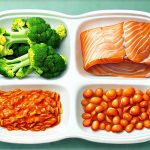The simple act of starting your day – or continuing it – with a warm beverage is often touted as beneficial for more than just comfort. Many cultures emphasize drinking warm fluids like tea, broth, or even simply warm water first thing in the morning. Conversely, skipping this practice and immediately consuming cooler or room-temperature drinks can surprisingly lead to digestive discomfort for some individuals. This isn’t necessarily a sign of illness, but rather an indication of how our digestive system responds to temperature changes and preparation. It highlights the delicate balance within our gut and how seemingly small habits can significantly impact overall well-being. Understanding why this occurs requires delving into the complexities of digestion itself and the physiological processes involved in breaking down food.
Our bodies are remarkably efficient machines, but they aren’t always optimized for rapid transitions. When we wake up, or haven’t eaten for several hours, our digestive system is relatively ‘dormant’. Introducing a cold liquid directly to this system can cause it to work harder and potentially experience temporary disruptions. This isn’t about temperature in the absolute sense – even room-temperature liquids can feel “cold” to an unprepared digestive tract. It’s more about the contrast between the internal body temperature and the incoming fluid, leading to a momentary shock that can manifest as bloating, cramping, or general discomfort. The effect varies greatly from person to person depending on factors like metabolism, hydration levels, pre-existing conditions, and individual sensitivity. If you’ve experienced rapid weight loss, consider exploring digestive tests to understand underlying issues.
The Role of Temperature in Digestion
The digestive system isn’t just one organ; it’s an intricate network spanning from the mouth to the rectum. Each stage – chewing, enzyme secretion, stomach churning, nutrient absorption – relies on optimal conditions. Temperature plays a crucial role in many of these processes. Think about how enzymes function best within specific temperature ranges. Similarly, the muscles involved in peristalsis (the wave-like contractions that move food along) operate more efficiently when warmed up. A sudden influx of coldness can temporarily constrict blood vessels and slow down these movements, leading to a feeling of sluggishness or discomfort.
Furthermore, the stomach itself requires warmth to effectively break down food. The process of digestion generates heat, but starting with a colder temperature means the stomach needs to expend more energy – and time – to bring things up to optimal working temperature. This can particularly impact individuals with sensitive digestive systems or conditions like Irritable Bowel Syndrome (IBS), where even minor disruptions can trigger significant symptoms. It’s important to note this isn’t about “shocking” the system in a harmful way, but rather introducing an unnecessary strain that some bodies are more susceptible to than others. If you suspect a deeper issue, checkpoints to review after a digestive health scare can be invaluable.
The connection between temperature and digestive health also extends to hydration. While staying hydrated is paramount, drinking cold liquids can sometimes lead to faster transit times through the digestive tract – meaning less time for nutrient absorption. This isn’t always a negative consequence, but it highlights how even seemingly healthy habits can be optimized based on individual needs and responses. Ultimately, prioritizing warm fluids, especially upon waking or between meals, is often about supporting rather than challenging the natural processes of digestion. You might find restorative meal ideas helpful if you’re recovering from a digestive illness.
Understanding Vata Dosha & Digestive Fire
The concept of “Vata” from Ayurvedic medicine offers a particularly insightful perspective on this phenomenon. In Ayurveda, Vata represents the principle of movement and air within the body. A balanced Vata is essential for healthy digestion, but cold temperatures are considered to aggravate Vata – disrupting its flow and leading to imbalances. This can manifest as bloating, gas, constipation, or other digestive issues. Drinking warm fluids helps pacify Vata by grounding it and promoting a sense of warmth and stability within the digestive system.
Similarly, Ayurveda emphasizes the importance of “Agni” – your digestive fire. Agni is responsible for transforming food into usable energy and eliminating waste products. A strong Agni thrives on warmth; coldness diminishes its capacity to effectively digest food. This explains why individuals with naturally weaker digestive fires (or imbalances in their Agni) may be more sensitive to the effects of cold liquids. Strengthening Agni through practices like mindful eating, incorporating warming spices (ginger, cinnamon), and prioritizing warm fluids is a cornerstone of Ayurvedic health philosophy. For those recovering from digestive surgery, supporting Agni can be crucial.
The Gut-Brain Connection & Discomfort Signals
The digestive system isn’t isolated; it’s intimately connected to the brain via what we now call the gut-brain axis. This bidirectional communication pathway means that signals from your gut can influence your mood and vice versa. When you experience digestive discomfort – like bloating or cramping after drinking a cold beverage – these sensations are transmitted to the brain, potentially contributing to feelings of stress, anxiety, or even low energy.
This link also explains why some people experience more pronounced symptoms than others. Individuals who are already prone to anxiety or have a history of gut-related issues may be more sensitive to these signals, amplifying the perceived discomfort. Furthermore, our emotional state can directly impact digestion – stress can slow down or inhibit digestive processes, making it harder for the body to cope with temperature fluctuations. Addressing both the physical and emotional aspects of digestive health is essential for long-term well-being. Consider assessments if major diet changes are impacting your gut-brain connection.
Simple Strategies for Improved Digestive Comfort
If you frequently experience discomfort after consuming cold beverages, there are several simple strategies you can implement:
- Start with Warm Fluids: Begin your day with a cup of warm water with lemon, herbal tea, or a light broth. This helps to gently awaken and prepare the digestive system.
- Gradual Temperature Changes: Avoid drastic temperature shifts. If you prefer drinking cooler liquids, gradually introduce them after having some warm fluid first.
- Mindful Hydration: Pay attention to how your body responds to different temperatures. Experiment with varying degrees of warmth and coolness to identify what works best for you.
- Prioritize Digestion-Supportive Foods: Incorporate foods that are easy to digest, like cooked vegetables, lean proteins, and whole grains. Avoid overly processed or greasy foods which can further strain the digestive system.
- Manage Stress: Practice stress-reducing techniques like yoga, meditation, or deep breathing exercises to support a healthy gut-brain connection.
Ultimately, listening to your body is key. There’s no one-size-fits-all solution when it comes to digestion and temperature preferences. By understanding the physiological mechanisms at play and incorporating simple lifestyle adjustments, you can minimize discomfort and optimize your digestive health for sustained well-being. Perhaps try some warm grain recipes for evening calm. Also, remember to review recommendations for testing after major stress events.


















